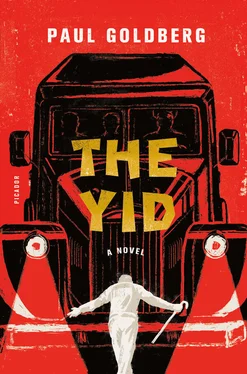They say he was a professor named Yakov Rapoport. They say he was arrested and kept in a Lubyanka cellar.
* * *
Levinson surveys the carnage. A smile creeps onto his elongated face. A line pops out of the mass of all the lines he’d ever committed to memory. It flashes before him, a spark from a play never staged, a text never translated:
Ikh for bald opvashn, inem Heylikn Land,
Dos merderishe blut
Fun mayn zindiker hant.
It’s wordier than the English original, and the meter is off, but Levinson is not a poet. This is the best he can do to relay the words spoken by Henry Bolingbroke in the final scene of Richard II , as the coffin of the murdered monarch is brought onstage:
(I’ll make a voyage to the Holy Land,
To wash this blood off from my guilty hand…)
* * *
On February 24, 1953, at 3:34 a.m., exactly four hours before sunrise, as a consequence of Levinson’s brilliant pirouette with Finnish daggers, Bolingbroke’s parting line is awash in fresh blood, and comedy, tragedy, and history abruptly join into one mighty stream.
On February 24, 1953, at 3:57 a.m., Friederich Robertovich Lewis gets out of a taxi at 1/4 Chkalov Street.
After more than two decades of shuttling between Moscow and the industrial cities of the Ural — Magnitogorsk, Chelyabinsk, Sverdlovsk — Lewis considers himself primarily a sibiryak , a Siberian.
As an outsider, he understands that Moscow is best appreciated before dawn, with moonlight and a fresh, thin sprinkling of snow. Its streets turned white, the big, grimy city acquires a purity of form, even the delicacy of a Japanese print. White powder, of course, is a promise of something better.
His destination, the residence of Solomon Shimonovich Levinson, an actor known to friends and family as der komandir , is on the second floor of a prerevolutionary building overlooking a small park strewn with the ruins of plank-and-wrought-iron benches.
Lewis has a key to der komandir ’s communal flat. He takes off his shoes, hangs up his sheepskin coat, and, stepping softly, walks through the long dark hallway of the komunalka. He knocks on the door, trying to wake up Levinson and no one else. This is a formality. Levinson’s door usually stays unlocked.
Related by marriage, Levinson and Lewis are survivors of what had been a large extended family. Loyalty to the dead is an element of their bond. There is a practical element as well. Lewis needs a cot in Moscow, sometimes for weeks at a time, and Levinson isn’t inconvenienced by the presence of a guest.
Over the years, they developed a greeting ritual. Every time Lewis knocks on the door of his room, Levinson responds in Yiddish: “Dos bist du?” Is that you?
“Neyn, nit ikh bin dos. S’iz Elye-Hanovi!” Lewis answers. No, it’s not me. It’s Elijah the Prophet!
There are variations on this theme. Lewis can announce himself as der Royte Kavaleriye (Red Cavalry), klezmorim mit muzike (an orchestra with music), Yoske Pendrik (a mocking Yiddish name for Jesus Christ) or Molotov mit von Ribbentrop.
He looks forward to the customary torrent of insults delivered in Levinson’s raspy voice.
Lewis no longer objects to the nickname Levinson gave him sometime in the thirties: der Komintern-shvartser.
This is grossly inaccurate. Lewis had nothing to do with the Comintern, the organization formed to stoke the flames of World Revolution. It was a job with the Arthur G. McKee Company of Cleveland that brought him to Russia two decades and two years ago. The other part of the nickname— shvartser —is accurate and therefore not offensive in the least. His pigmentation, which is unusually dark for an American Negro, gives him the appearance of an African sovereign.
This time Levinson doesn’t answer.
Lewis opens the door, and before his eyes adjust to darkness, his toes come in contact with a large, dark shape, and a warm, sticky liquid starts to seep into his thick woolen socks. After his initial shock, Lewis comes to the realization that he is standing in a pool of blood and that his toes are wedged beneath the fingers of a dead man.
“You crazy old motherfucker,” he whispers in English. “Now you done it.”
“Red yidish,” says Levinson, who speaks no English.
Three corpses lie on the floor, each in its own dark puddle.
“ A meshugene kop,” says Lewis, shaking his head in disbelief.
A madman.
* * *
Lewis has seen many a bloodied corpse. His encounters with violent death began when he was a child, during race riots in Omaha. In 1931, Lewis arrived in Magnitogorsk to become a welder in Stalin’s frozen City of Steel. Safety was a bourgeois luxury, casualties not a problem. Welders worked on rickety scaffolds or walked the girders thirty to fifty meters in the air, struggling not to lose their footing on the ice, praying to stay upright in the brutal Siberian wind. Those who fell out of the sky were christened krasnyye lepyoshki (red flatbreads).
The presence of three corpses per se doesn’t shock Lewis. The uniforms do. In addition to accepting that this is not a hallucination, he has to assess the implications of having become an accessory to a crime against the state.
First, he whispers nervously in Yiddish. (In his private papers, the Afro-American poet Langston Hughes wrote that during his extensive stay in the USSR he spent an evening with a Negro welder and engineering student who expounded on his interest in Yiddish. Hughes’s interlocutor explained that speaking Yiddish allowed him to express solidarity with the Jewish working masses. Saying fuck you to both Jim Crow and the Black Hundreds, he felt like a “double nigger.” This was, of course, Lewis.)
In a dull rant, Lewis calls Levinson an alter nar (old fool); an alter payats (old jester); and, of course, a mad, wild alter kaker (old shitter). He wishes Levinson a case of cholera in his side, the draining of his blood by leeches, an abundance of painful boils, an uncontrollable lice infestation, and a variety of other illnesses, plagues, and medical conditions.
With each curse, he blows off more steam, bringing closer the moment when he will be able to begin the deliberate process of integrating this fantastic event into the world of real things.
* * *
Upon arrival in the USSR, Lewis noted that his new comrades almost uniformly exhibited a shocking indifference toward death. In Magnitogorsk, a human life was regarded as an input, an attachment to a welding torch or a mason’s trowel. He shuddered to think of what happened when his new countrymen went to war.
Covering his eyes with a shaking hand, Lewis presses his brows until they cover his eyelashes, creating something of an inner shelter. Then, in the darkness of his skull, he counts, starting at ten and descending slowly to one.
“When did this happen?” he asks, regaining a semblance of control.
“About thirty minutes ago,” says Levinson. He seems unaffected by what he has done.
“And you’ve been sitting in the dark since?”
Levinson nods.
“Why did you do it?”
The old man has to think before he answers. “Because I knew how.”
If you have weapons and combat skills, and if you don’t fear violent death, why not fight back? This is at least somewhat logical.
“Did you expect that I would go peacefully?”
“ Neyn ,” says Lewis in Yiddish. Upon reflection, he adds in English, “You mother. What the fuck do you think this is? The fucking Civil War?”
In theory, the hopelessness of struggle shouldn’t preclude resistance. There is no shortage of people like Levinson, whose combat skills exceed those of soldiers of the MGB. Yet, these veterans invariably choose to surrender and hope that by some miracle they might survive. For whatever reason, in Moscow of 1953, people don’t take arms.
Читать дальше












